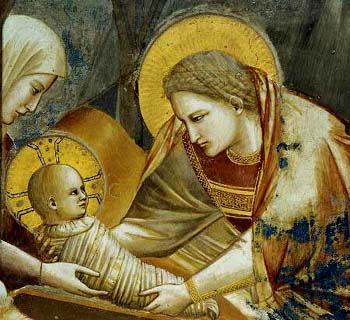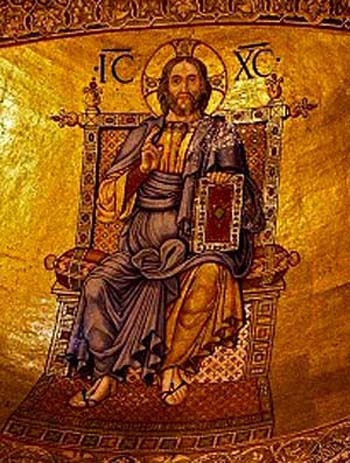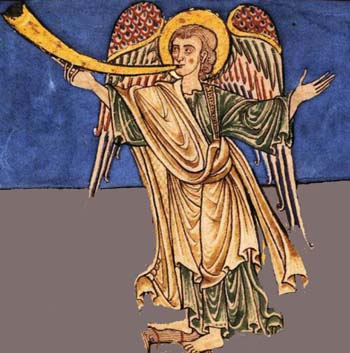 |
Theology of History
The Two Advents of Our Lord Jesus Christ
Blessed Jacobus of Voragine
The Advent of Our Lord is celebrated for four weeks to signify that His coming is fourfold: He came to us in the flesh, He comes into our hearts, He comes to us at death, and He will come at the Last Judgment. The fourth week is not completed, because the glory of the elect to be bestowed at the last coming of Our Lord will never end.
While the coming of Our Lord is fourfold, the Church turns especially to two of them, the coming of Our Lord in the flesh and His coming at the Last Judgment. Thus, the Advent fast is in part a fast of rejoicing because of Christ's coming in the flesh, the Incarnation; at the same time it is in part a fast of contrition, looking to the supreme coming of Christ at the Last Judgment.
I - Regarding Our Lord's coming in the flesh, two things should be considered: how it is opportune and how it is useful.

The first coming of Our Lord should give us joy |
1. It is opportune first, because man, condemned by nature to have an incomplete knowledge of God, had fallen into the worst errors of idolatry and was reduced to cry out, "Enlighten my eyes."' Second, Our Lord came in the fullness of time as St. Paul says in the Epistle to the Galatians. Third, He came when the entire world was sick, as St. Augustine says: "The great Physician came when mankind was lying ill through the whole world."
This is why the Church, in the seven antiphons sung before the Lord's Nativity, remembers the different kinds of illnesses and how opportune this divine remedy is. Before the Son of God came in the flesh, we were ignorant and blind, subject to eternal punishment, slaves of the devil, shackled by our sinful habits, enveloped in darkness, exiled from our true motherland. This is why those antiphons proclaim Our Lord as our Master, our Redeemer, our Liberator, our Guide, our Enlightener and our Savior.
2. Regarding the usefulness of the coming of Christ, diverse authorities define it in different ways. Jesus Christ Himself in the Gospel of St. Luke tells us that He came for seven reasons: to console the poor, to cure the afflicted, to liberate the captives, to enlighten the ignorant, to forgive the sinners, to redeem the human genre and to recompense each one according to his merits. And St. Bernard says: “We suffer from a threefold illness: We are easy to seduce, slow to act and weak to resist. Hence the coming of Our Lord is necessary first to enlighten our blindness and second to help our weakness.”
II - Regarding the second coming, that is, the Last Judgment, we should consider the circumstances that will precede it and those that will accompany it.

The second coming of Our Lord for the Final Judgment should raise our contrition |
1. Three kinds of circumstances will precede the Last Judgment: terrible signs, the imposture of the Antichrist, and an immense fire on the earth.
A. Five types of signs will precede the Last Judgment for, as St. Luke says: “There will be signs in the sun, moon and stars; on the earth, nations will be in anguish and perplexity at the roaring and tossing of the sea. (21:25) We can find a commentary on all these things in the Apocalypse.
St. Jerome, in his turn, found 15 signs preceding the Last Judgment in the annals of the Hebrews:
- On the first day, the ocean will rise above the mountains and will stand upright, immobile like a wall;
- On the second day, the ocean will sink so low that one will barely be able to see it;
- On the third day, sea monsters will appear on the waves and will utter roars that will rise up to heaven;
- On the fourth day, the water in the ocean will boil;
- On the fifth day, the trees and all plants will exude a dew of blood;
- On the sixth day, all the buildings will fall down;
- On the seventh day, the stones will break into four pieces, which will clash against one another;
- On the eighth day, a universal earthquake will lay every man and animal low on the ground;
- On the ninth day, the earth will be leveled and the mountains and hills will be reduced to dust;
- On the tenth day, men will leave their hidden places and wander like madmen, without being able to speak to each other;
- On the eleventh day, the bones of the dead will come out of their graves;
- On the twelfth day, the stars will fall from the firmament;
- On the thirteenth day, all living beings will die to be resurrected afterwards with the dead;
- On the fourteenth day, the sky and earth will burn;
- On the fifteenth day, there will be a new heaven and a new earth, and all will be resurrected.
B. The Last Judgment will be preceded by the imposture of the Antichrist, who will try to deceive men in four ways:
- By a false interpretation of the Scriptures trying to prove that he is the promised Messiah;
- By the working of miracles;
- By the distribution of gifts;
- By the infliction of tortures.
C. The Last Judgment will be preceded by a violent fire, lit by God himself to renew the world, to punish the reprobate and to bring attention to the group of the elect.

The Angel will announce the signs of the end |
2. Regarding the circumstances that will accompany the Last Judgment, the first to be named is the separation of the good from the evil ones. For it is known that the Judge will come in the Valley of Josaphat and place the good at His right and evil ones at His left. This does not signify, as St. Jerome observes, that all men will have to be in that small valley, but only that it will be the center of the Judgment. This does not exclude that God, if He so desires, may place in that space an infinite number of men [since their resurrected bodies will no longer take up space].
Next comes the question of knowing the categories into which men will be divided when the Final Judgment comes. St. Gregory admits four categories: two for the reprobates and two for the elect. Among the reprobates will be those who will be condemned and those who were already condemned, about whom it was said: “The one who does not believe, will be judged previously.” Among the elect will be those who will judge the others sitting alongside the Judge.
At the Final Judgment the signs of the Passion will be present: the Cross, the instruments of the Passion and His scars; St John Chrysostom says that “The Cross and His scars will be more brilliant than the rays of the sun.”
The Judge will be inflexibly severe. He will bend neither from fear, since He is Almighty, nor from gifts, because He is richness itself, nor from hatred because He is goodness itself, nor from love because He is justice itself, nor from error because He is wisdom itself. Against this Wisdom neither the allegations of lawyers, nor the sophisms of philosophers, nor the phrases of orators, nor the ruses of hypocrites will prevail.
The Judge will be as severe as the prosecutor will be implacable. In other words, the sinner will face three prosecutors: the Devil, sin and the entire world, because, as St. Chrysostom says: “On that day, sky and earth, water, sun and moon, day and night, the whole world will raise against us before God, in testimony of our sins.”
Three witnesses will also testify against us, all three infallible: First, God, who said to us through the voice of Jeremy: “I am at the same time judge and witness;” second, our conscience, and third, our guardian Angel, for we read in the book of Job: “Heavens (that is, the Angels) will reveal his iniquity.”
Finally, the sentence will be irrevocable. Indeed, the sentence is irrevocable for three reasons: the excellence of the Judge, the evidence of the crime; the impossibility of reversing the chastisement. For in the sentence pronounced against us in the Last Judgment, there will be no King, Emperor or Pope to whom we can appeal the judgment pronounced against us.

Translated by TIA desk from
La Légende Dorée, Paris: Perrin, 1909, pp.3-7
Posted December 12, 2011

Related Articles of Interest
 Expectation of Our Lady Expectation of Our Lady
 The Fidelity of the Remnant throughout History The Fidelity of the Remnant throughout History
 The Grace of Contrition and the Reign of Mary The Grace of Contrition and the Reign of Mary
 The Royalty of Christ the King The Royalty of Christ the King
 The Fiery Prayer for the Apostles of the Latter Times The Fiery Prayer for the Apostles of the Latter Times
 Will He Find Faith? Will He Find Faith?
 Elias, the End Times Prophet Elias, the End Times Prophet
 The Abomination of Desolation in the Present The Abomination of Desolation in the Present


|
Theology of History | Religious | Home | Books | CDs | Search | Contact Us | Donate

© 2002- Tradition in Action, Inc. All Rights Reserved
|
 |
|